Education Standards for Financial Planners and Ethical Considerations
VerifiedAdded on 2023/03/20
|15
|4250
|21
Report
AI Summary
This report provides a comprehensive analysis of the education standards for financial planners, focusing on the importance of ethical behavior and the role of higher education in fostering ethical decision-making. It begins with an introduction to the ethical challenges faced by the financial planning industry, particularly in the post-Global Financial Crisis environment. The report then delves into the significance of ethical behavior in financial planning, highlighting the need for financial planners to prioritize the interests of their clients and act with integrity. It explores various ethical theories, such as deontology, teleology, utilitarianism, virtue ethics, and egoism, to provide a framework for understanding ethical decision-making in the field. The report further examines the current landscape of higher education in financial planning, including the requirements set by professional bodies like the FPA in Australia and the importance of behavioral ethics in the development of financial planners. It addresses the role of ethical education and awareness as a means to mitigate issues associated with unethical decisions. The report concludes by emphasizing the need for continuous improvement in the education standards for financial planners, with recommendations for enhancing ethical development and ensuring that financial advisors are equipped with the knowledge and skills necessary to act in the best interests of their clients.

Education Standards for Financial Planners and how it should be done
1
1
Paraphrase This Document
Need a fresh take? Get an instant paraphrase of this document with our AI Paraphraser
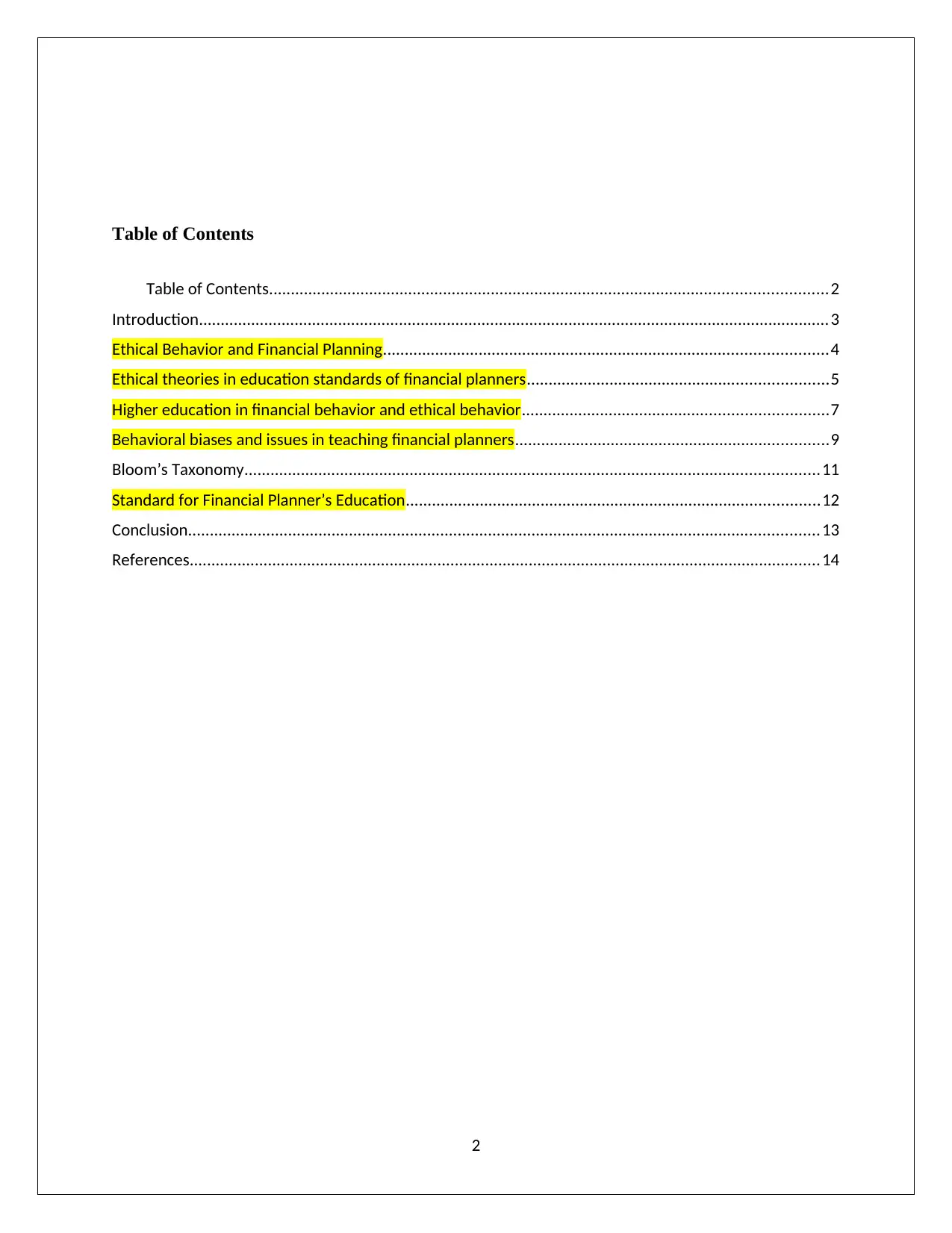
Table of Contents
Table of Contents................................................................................................................................2
Introduction.................................................................................................................................................3
Ethical Behavior and Financial Planning......................................................................................................4
Ethical theories in education standards of financial planners.....................................................................5
Higher education in financial behavior and ethical behavior......................................................................7
Behavioral biases and issues in teaching financial planners........................................................................9
Bloom’s Taxonomy....................................................................................................................................11
Standard for Financial Planner’s Education...............................................................................................12
Conclusion.................................................................................................................................................13
References.................................................................................................................................................14
2
Table of Contents................................................................................................................................2
Introduction.................................................................................................................................................3
Ethical Behavior and Financial Planning......................................................................................................4
Ethical theories in education standards of financial planners.....................................................................5
Higher education in financial behavior and ethical behavior......................................................................7
Behavioral biases and issues in teaching financial planners........................................................................9
Bloom’s Taxonomy....................................................................................................................................11
Standard for Financial Planner’s Education...............................................................................................12
Conclusion.................................................................................................................................................13
References.................................................................................................................................................14
2
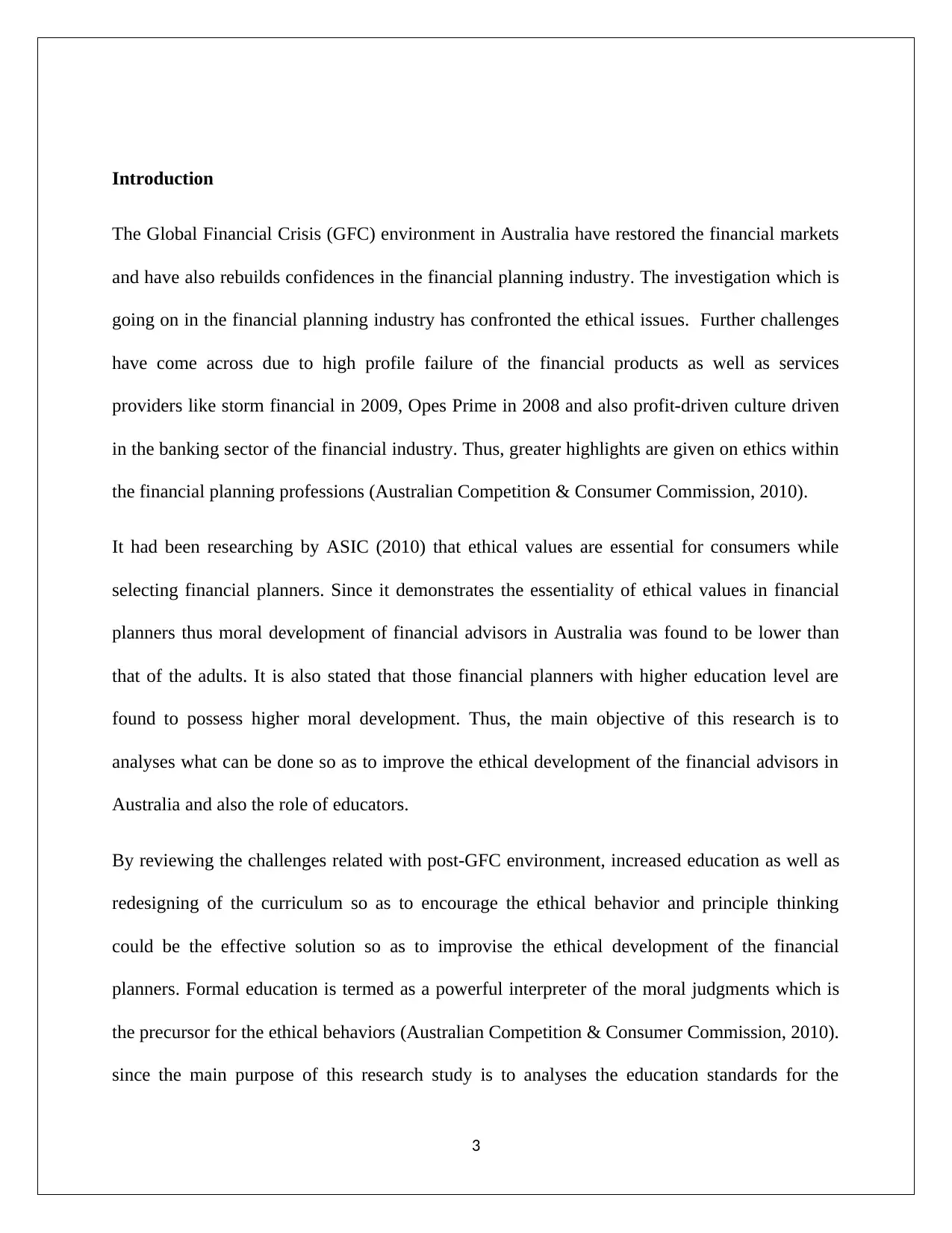
Introduction
The Global Financial Crisis (GFC) environment in Australia have restored the financial markets
and have also rebuilds confidences in the financial planning industry. The investigation which is
going on in the financial planning industry has confronted the ethical issues. Further challenges
have come across due to high profile failure of the financial products as well as services
providers like storm financial in 2009, Opes Prime in 2008 and also profit-driven culture driven
in the banking sector of the financial industry. Thus, greater highlights are given on ethics within
the financial planning professions (Australian Competition & Consumer Commission, 2010).
It had been researching by ASIC (2010) that ethical values are essential for consumers while
selecting financial planners. Since it demonstrates the essentiality of ethical values in financial
planners thus moral development of financial advisors in Australia was found to be lower than
that of the adults. It is also stated that those financial planners with higher education level are
found to possess higher moral development. Thus, the main objective of this research is to
analyses what can be done so as to improve the ethical development of the financial advisors in
Australia and also the role of educators.
By reviewing the challenges related with post-GFC environment, increased education as well as
redesigning of the curriculum so as to encourage the ethical behavior and principle thinking
could be the effective solution so as to improvise the ethical development of the financial
planners. Formal education is termed as a powerful interpreter of the moral judgments which is
the precursor for the ethical behaviors (Australian Competition & Consumer Commission, 2010).
since the main purpose of this research study is to analyses the education standards for the
3
The Global Financial Crisis (GFC) environment in Australia have restored the financial markets
and have also rebuilds confidences in the financial planning industry. The investigation which is
going on in the financial planning industry has confronted the ethical issues. Further challenges
have come across due to high profile failure of the financial products as well as services
providers like storm financial in 2009, Opes Prime in 2008 and also profit-driven culture driven
in the banking sector of the financial industry. Thus, greater highlights are given on ethics within
the financial planning professions (Australian Competition & Consumer Commission, 2010).
It had been researching by ASIC (2010) that ethical values are essential for consumers while
selecting financial planners. Since it demonstrates the essentiality of ethical values in financial
planners thus moral development of financial advisors in Australia was found to be lower than
that of the adults. It is also stated that those financial planners with higher education level are
found to possess higher moral development. Thus, the main objective of this research is to
analyses what can be done so as to improve the ethical development of the financial advisors in
Australia and also the role of educators.
By reviewing the challenges related with post-GFC environment, increased education as well as
redesigning of the curriculum so as to encourage the ethical behavior and principle thinking
could be the effective solution so as to improvise the ethical development of the financial
planners. Formal education is termed as a powerful interpreter of the moral judgments which is
the precursor for the ethical behaviors (Australian Competition & Consumer Commission, 2010).
since the main purpose of this research study is to analyses the education standards for the
3
⊘ This is a preview!⊘
Do you want full access?
Subscribe today to unlock all pages.

Trusted by 1+ million students worldwide
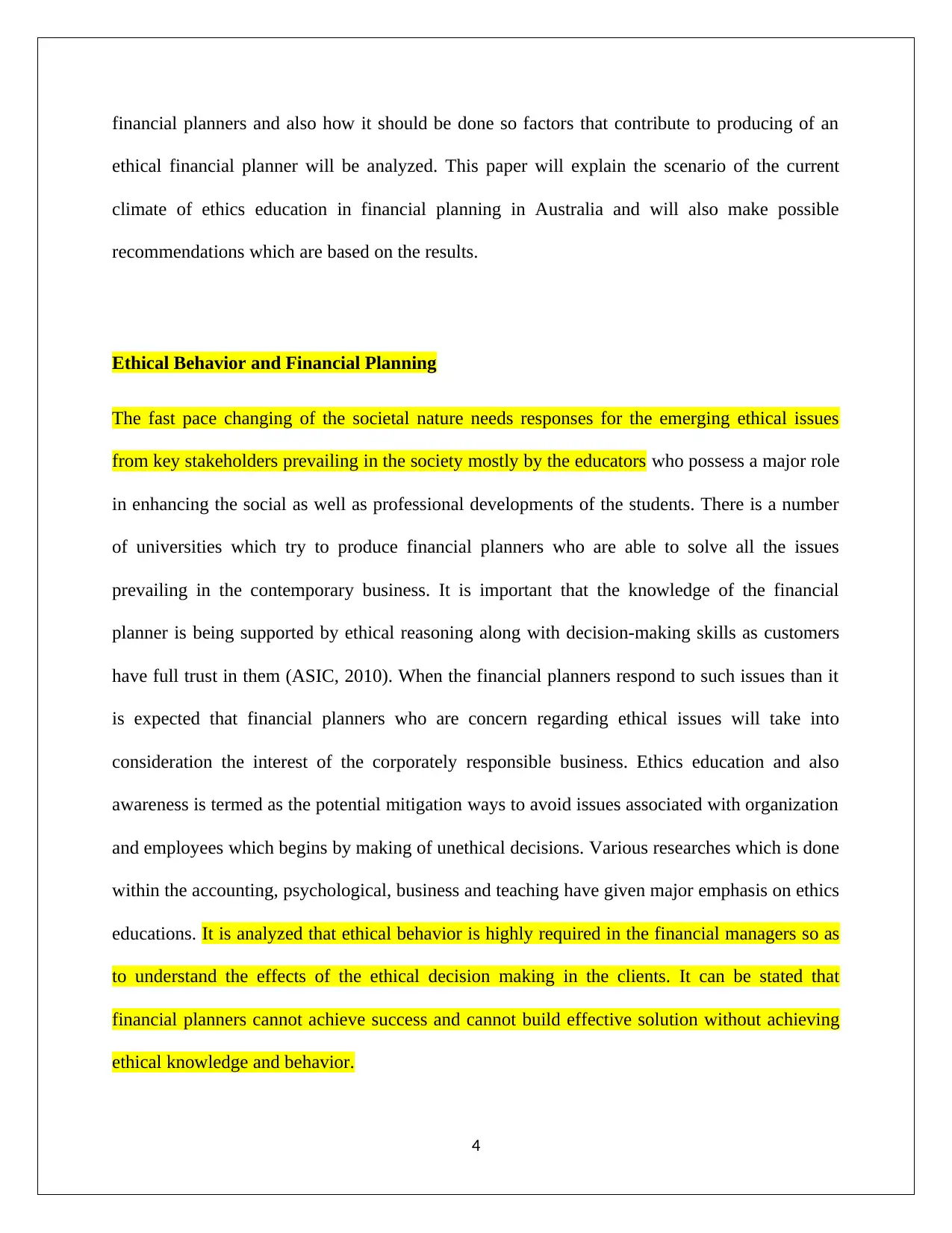
financial planners and also how it should be done so factors that contribute to producing of an
ethical financial planner will be analyzed. This paper will explain the scenario of the current
climate of ethics education in financial planning in Australia and will also make possible
recommendations which are based on the results.
Ethical Behavior and Financial Planning
The fast pace changing of the societal nature needs responses for the emerging ethical issues
from key stakeholders prevailing in the society mostly by the educators who possess a major role
in enhancing the social as well as professional developments of the students. There is a number
of universities which try to produce financial planners who are able to solve all the issues
prevailing in the contemporary business. It is important that the knowledge of the financial
planner is being supported by ethical reasoning along with decision-making skills as customers
have full trust in them (ASIC, 2010). When the financial planners respond to such issues than it
is expected that financial planners who are concern regarding ethical issues will take into
consideration the interest of the corporately responsible business. Ethics education and also
awareness is termed as the potential mitigation ways to avoid issues associated with organization
and employees which begins by making of unethical decisions. Various researches which is done
within the accounting, psychological, business and teaching have given major emphasis on ethics
educations. It is analyzed that ethical behavior is highly required in the financial managers so as
to understand the effects of the ethical decision making in the clients. It can be stated that
financial planners cannot achieve success and cannot build effective solution without achieving
ethical knowledge and behavior.
4
ethical financial planner will be analyzed. This paper will explain the scenario of the current
climate of ethics education in financial planning in Australia and will also make possible
recommendations which are based on the results.
Ethical Behavior and Financial Planning
The fast pace changing of the societal nature needs responses for the emerging ethical issues
from key stakeholders prevailing in the society mostly by the educators who possess a major role
in enhancing the social as well as professional developments of the students. There is a number
of universities which try to produce financial planners who are able to solve all the issues
prevailing in the contemporary business. It is important that the knowledge of the financial
planner is being supported by ethical reasoning along with decision-making skills as customers
have full trust in them (ASIC, 2010). When the financial planners respond to such issues than it
is expected that financial planners who are concern regarding ethical issues will take into
consideration the interest of the corporately responsible business. Ethics education and also
awareness is termed as the potential mitigation ways to avoid issues associated with organization
and employees which begins by making of unethical decisions. Various researches which is done
within the accounting, psychological, business and teaching have given major emphasis on ethics
educations. It is analyzed that ethical behavior is highly required in the financial managers so as
to understand the effects of the ethical decision making in the clients. It can be stated that
financial planners cannot achieve success and cannot build effective solution without achieving
ethical knowledge and behavior.
4
Paraphrase This Document
Need a fresh take? Get an instant paraphrase of this document with our AI Paraphraser
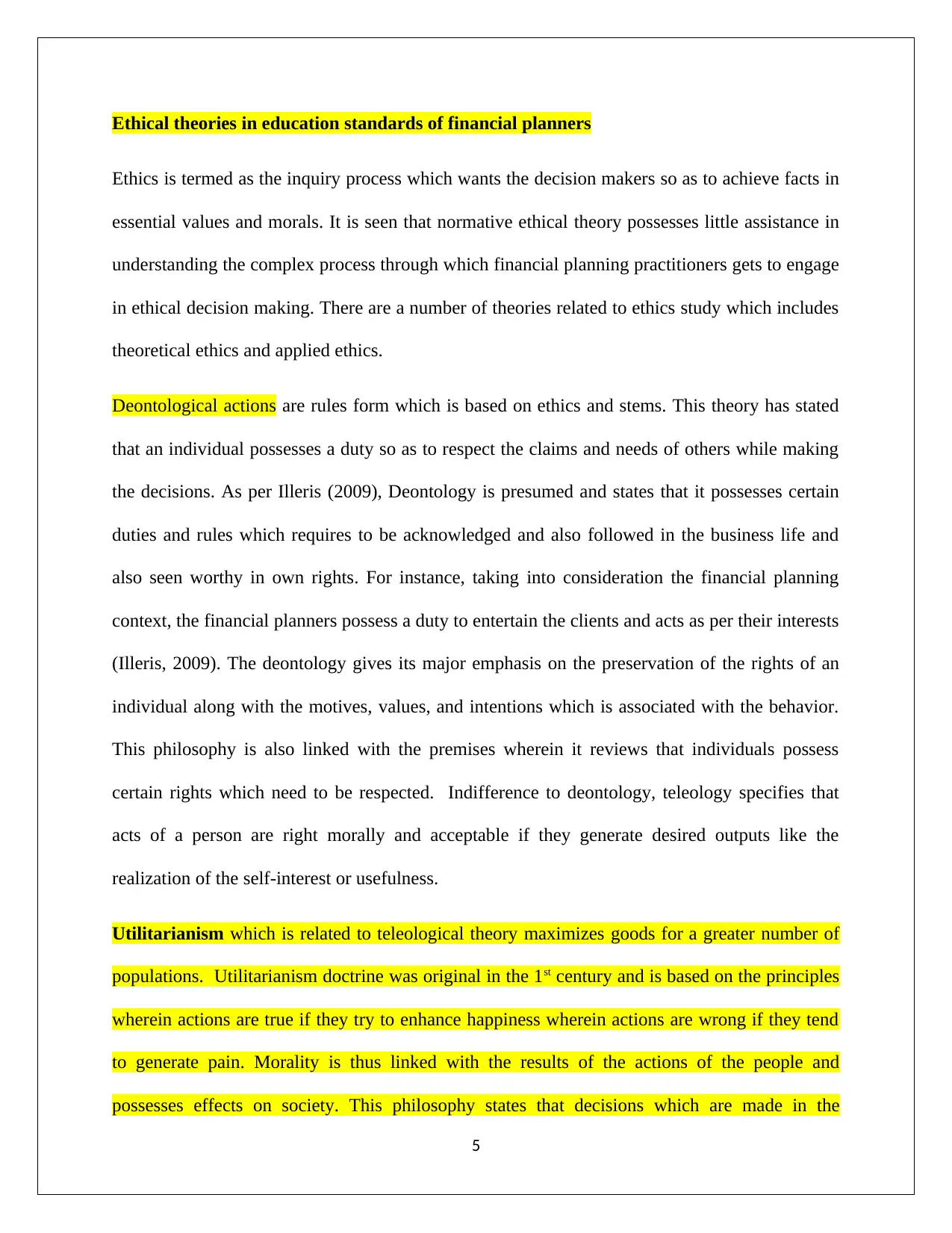
Ethical theories in education standards of financial planners
Ethics is termed as the inquiry process which wants the decision makers so as to achieve facts in
essential values and morals. It is seen that normative ethical theory possesses little assistance in
understanding the complex process through which financial planning practitioners gets to engage
in ethical decision making. There are a number of theories related to ethics study which includes
theoretical ethics and applied ethics.
Deontological actions are rules form which is based on ethics and stems. This theory has stated
that an individual possesses a duty so as to respect the claims and needs of others while making
the decisions. As per Illeris (2009), Deontology is presumed and states that it possesses certain
duties and rules which requires to be acknowledged and also followed in the business life and
also seen worthy in own rights. For instance, taking into consideration the financial planning
context, the financial planners possess a duty to entertain the clients and acts as per their interests
(Illeris, 2009). The deontology gives its major emphasis on the preservation of the rights of an
individual along with the motives, values, and intentions which is associated with the behavior.
This philosophy is also linked with the premises wherein it reviews that individuals possess
certain rights which need to be respected. Indifference to deontology, teleology specifies that
acts of a person are right morally and acceptable if they generate desired outputs like the
realization of the self-interest or usefulness.
Utilitarianism which is related to teleological theory maximizes goods for a greater number of
populations. Utilitarianism doctrine was original in the 1st century and is based on the principles
wherein actions are true if they try to enhance happiness wherein actions are wrong if they tend
to generate pain. Morality is thus linked with the results of the actions of the people and
possesses effects on society. This philosophy states that decisions which are made in the
5
Ethics is termed as the inquiry process which wants the decision makers so as to achieve facts in
essential values and morals. It is seen that normative ethical theory possesses little assistance in
understanding the complex process through which financial planning practitioners gets to engage
in ethical decision making. There are a number of theories related to ethics study which includes
theoretical ethics and applied ethics.
Deontological actions are rules form which is based on ethics and stems. This theory has stated
that an individual possesses a duty so as to respect the claims and needs of others while making
the decisions. As per Illeris (2009), Deontology is presumed and states that it possesses certain
duties and rules which requires to be acknowledged and also followed in the business life and
also seen worthy in own rights. For instance, taking into consideration the financial planning
context, the financial planners possess a duty to entertain the clients and acts as per their interests
(Illeris, 2009). The deontology gives its major emphasis on the preservation of the rights of an
individual along with the motives, values, and intentions which is associated with the behavior.
This philosophy is also linked with the premises wherein it reviews that individuals possess
certain rights which need to be respected. Indifference to deontology, teleology specifies that
acts of a person are right morally and acceptable if they generate desired outputs like the
realization of the self-interest or usefulness.
Utilitarianism which is related to teleological theory maximizes goods for a greater number of
populations. Utilitarianism doctrine was original in the 1st century and is based on the principles
wherein actions are true if they try to enhance happiness wherein actions are wrong if they tend
to generate pain. Morality is thus linked with the results of the actions of the people and
possesses effects on society. This philosophy states that decisions which are made in the
5
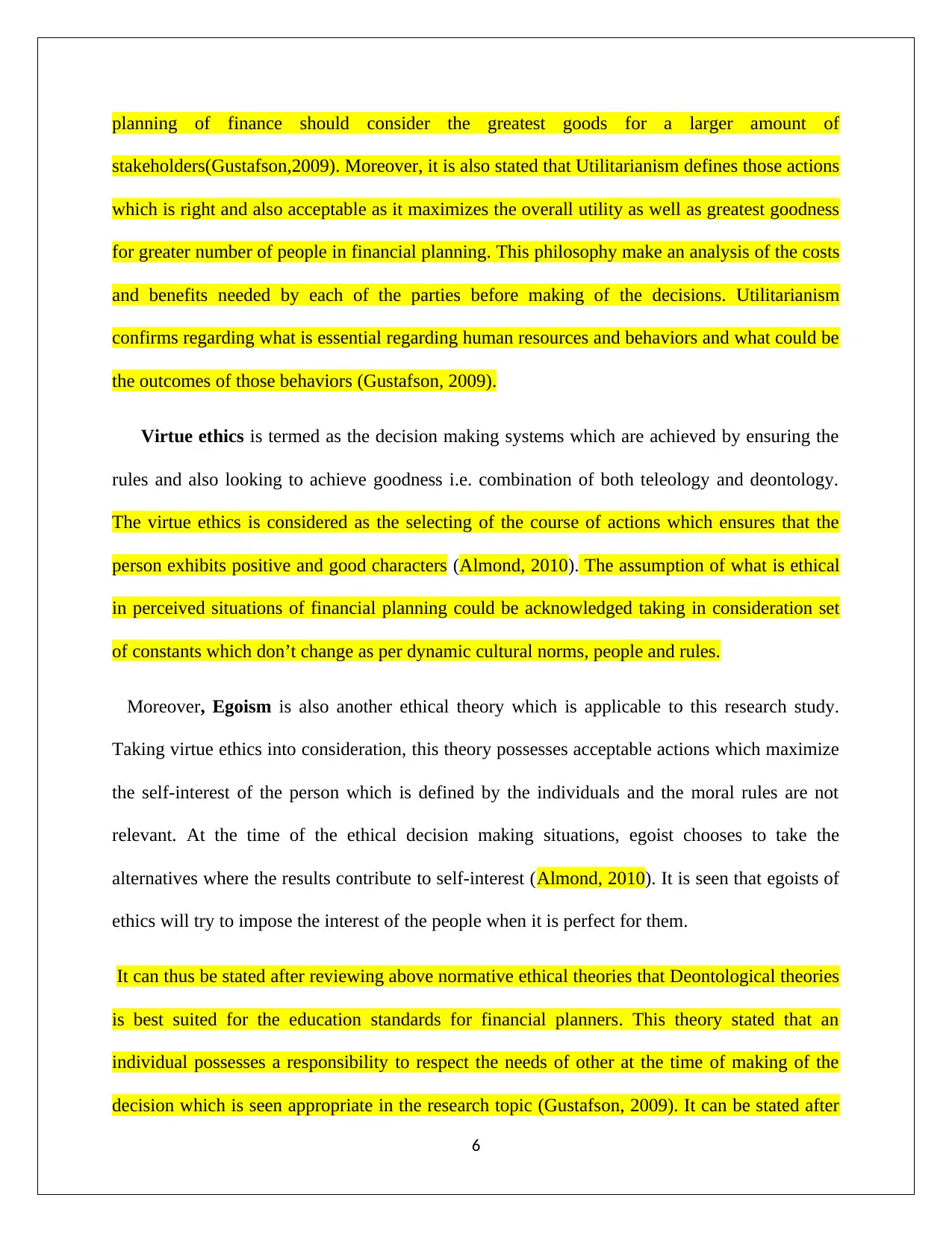
planning of finance should consider the greatest goods for a larger amount of
stakeholders(Gustafson,2009). Moreover, it is also stated that Utilitarianism defines those actions
which is right and also acceptable as it maximizes the overall utility as well as greatest goodness
for greater number of people in financial planning. This philosophy make an analysis of the costs
and benefits needed by each of the parties before making of the decisions. Utilitarianism
confirms regarding what is essential regarding human resources and behaviors and what could be
the outcomes of those behaviors (Gustafson, 2009).
Virtue ethics is termed as the decision making systems which are achieved by ensuring the
rules and also looking to achieve goodness i.e. combination of both teleology and deontology.
The virtue ethics is considered as the selecting of the course of actions which ensures that the
person exhibits positive and good characters (Almond, 2010). The assumption of what is ethical
in perceived situations of financial planning could be acknowledged taking in consideration set
of constants which don’t change as per dynamic cultural norms, people and rules.
Moreover, Egoism is also another ethical theory which is applicable to this research study.
Taking virtue ethics into consideration, this theory possesses acceptable actions which maximize
the self-interest of the person which is defined by the individuals and the moral rules are not
relevant. At the time of the ethical decision making situations, egoist chooses to take the
alternatives where the results contribute to self-interest (Almond, 2010). It is seen that egoists of
ethics will try to impose the interest of the people when it is perfect for them.
It can thus be stated after reviewing above normative ethical theories that Deontological theories
is best suited for the education standards for financial planners. This theory stated that an
individual possesses a responsibility to respect the needs of other at the time of making of the
decision which is seen appropriate in the research topic (Gustafson, 2009). It can be stated after
6
stakeholders(Gustafson,2009). Moreover, it is also stated that Utilitarianism defines those actions
which is right and also acceptable as it maximizes the overall utility as well as greatest goodness
for greater number of people in financial planning. This philosophy make an analysis of the costs
and benefits needed by each of the parties before making of the decisions. Utilitarianism
confirms regarding what is essential regarding human resources and behaviors and what could be
the outcomes of those behaviors (Gustafson, 2009).
Virtue ethics is termed as the decision making systems which are achieved by ensuring the
rules and also looking to achieve goodness i.e. combination of both teleology and deontology.
The virtue ethics is considered as the selecting of the course of actions which ensures that the
person exhibits positive and good characters (Almond, 2010). The assumption of what is ethical
in perceived situations of financial planning could be acknowledged taking in consideration set
of constants which don’t change as per dynamic cultural norms, people and rules.
Moreover, Egoism is also another ethical theory which is applicable to this research study.
Taking virtue ethics into consideration, this theory possesses acceptable actions which maximize
the self-interest of the person which is defined by the individuals and the moral rules are not
relevant. At the time of the ethical decision making situations, egoist chooses to take the
alternatives where the results contribute to self-interest (Almond, 2010). It is seen that egoists of
ethics will try to impose the interest of the people when it is perfect for them.
It can thus be stated after reviewing above normative ethical theories that Deontological theories
is best suited for the education standards for financial planners. This theory stated that an
individual possesses a responsibility to respect the needs of other at the time of making of the
decision which is seen appropriate in the research topic (Gustafson, 2009). It can be stated after
6
⊘ This is a preview!⊘
Do you want full access?
Subscribe today to unlock all pages.

Trusted by 1+ million students worldwide
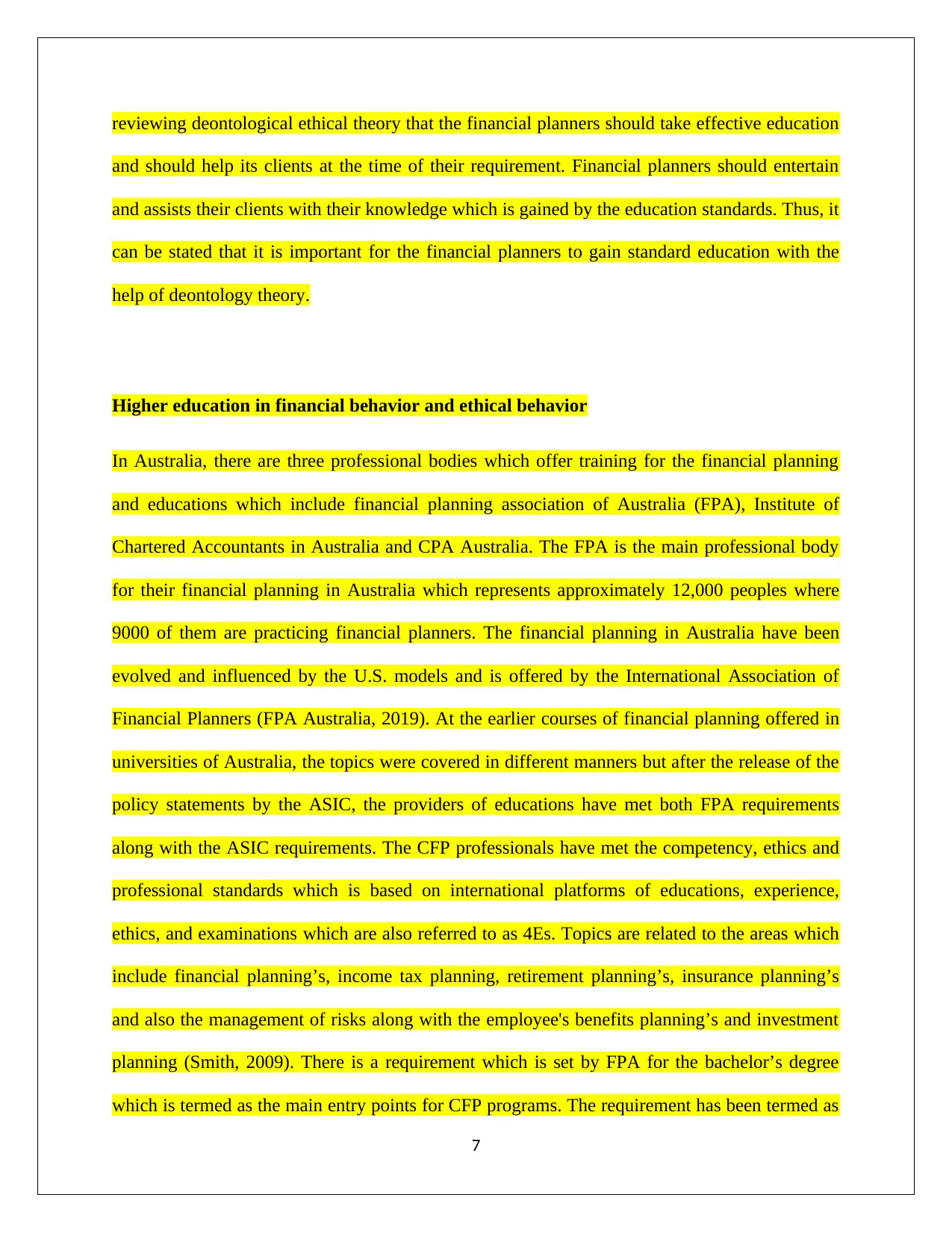
reviewing deontological ethical theory that the financial planners should take effective education
and should help its clients at the time of their requirement. Financial planners should entertain
and assists their clients with their knowledge which is gained by the education standards. Thus, it
can be stated that it is important for the financial planners to gain standard education with the
help of deontology theory.
Higher education in financial behavior and ethical behavior
In Australia, there are three professional bodies which offer training for the financial planning
and educations which include financial planning association of Australia (FPA), Institute of
Chartered Accountants in Australia and CPA Australia. The FPA is the main professional body
for their financial planning in Australia which represents approximately 12,000 peoples where
9000 of them are practicing financial planners. The financial planning in Australia have been
evolved and influenced by the U.S. models and is offered by the International Association of
Financial Planners (FPA Australia, 2019). At the earlier courses of financial planning offered in
universities of Australia, the topics were covered in different manners but after the release of the
policy statements by the ASIC, the providers of educations have met both FPA requirements
along with the ASIC requirements. The CFP professionals have met the competency, ethics and
professional standards which is based on international platforms of educations, experience,
ethics, and examinations which are also referred to as 4Es. Topics are related to the areas which
include financial planning’s, income tax planning, retirement planning’s, insurance planning’s
and also the management of risks along with the employee's benefits planning’s and investment
planning (Smith, 2009). There is a requirement which is set by FPA for the bachelor’s degree
which is termed as the main entry points for CFP programs. The requirement has been termed as
7
and should help its clients at the time of their requirement. Financial planners should entertain
and assists their clients with their knowledge which is gained by the education standards. Thus, it
can be stated that it is important for the financial planners to gain standard education with the
help of deontology theory.
Higher education in financial behavior and ethical behavior
In Australia, there are three professional bodies which offer training for the financial planning
and educations which include financial planning association of Australia (FPA), Institute of
Chartered Accountants in Australia and CPA Australia. The FPA is the main professional body
for their financial planning in Australia which represents approximately 12,000 peoples where
9000 of them are practicing financial planners. The financial planning in Australia have been
evolved and influenced by the U.S. models and is offered by the International Association of
Financial Planners (FPA Australia, 2019). At the earlier courses of financial planning offered in
universities of Australia, the topics were covered in different manners but after the release of the
policy statements by the ASIC, the providers of educations have met both FPA requirements
along with the ASIC requirements. The CFP professionals have met the competency, ethics and
professional standards which is based on international platforms of educations, experience,
ethics, and examinations which are also referred to as 4Es. Topics are related to the areas which
include financial planning’s, income tax planning, retirement planning’s, insurance planning’s
and also the management of risks along with the employee's benefits planning’s and investment
planning (Smith, 2009). There is a requirement which is set by FPA for the bachelor’s degree
which is termed as the main entry points for CFP programs. The requirement has been termed as
7
Paraphrase This Document
Need a fresh take? Get an instant paraphrase of this document with our AI Paraphraser
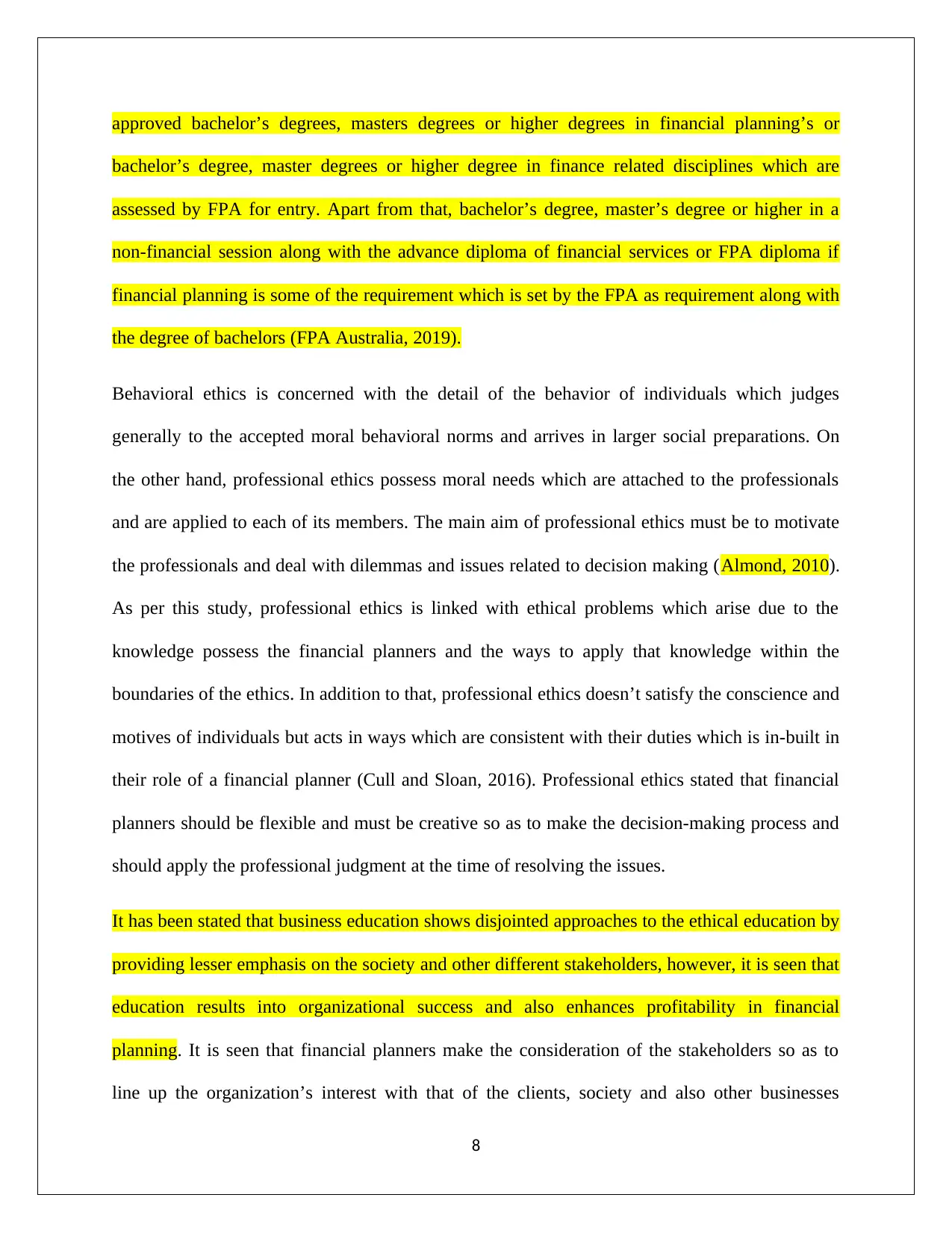
approved bachelor’s degrees, masters degrees or higher degrees in financial planning’s or
bachelor’s degree, master degrees or higher degree in finance related disciplines which are
assessed by FPA for entry. Apart from that, bachelor’s degree, master’s degree or higher in a
non-financial session along with the advance diploma of financial services or FPA diploma if
financial planning is some of the requirement which is set by the FPA as requirement along with
the degree of bachelors (FPA Australia, 2019).
Behavioral ethics is concerned with the detail of the behavior of individuals which judges
generally to the accepted moral behavioral norms and arrives in larger social preparations. On
the other hand, professional ethics possess moral needs which are attached to the professionals
and are applied to each of its members. The main aim of professional ethics must be to motivate
the professionals and deal with dilemmas and issues related to decision making (Almond, 2010).
As per this study, professional ethics is linked with ethical problems which arise due to the
knowledge possess the financial planners and the ways to apply that knowledge within the
boundaries of the ethics. In addition to that, professional ethics doesn’t satisfy the conscience and
motives of individuals but acts in ways which are consistent with their duties which is in-built in
their role of a financial planner (Cull and Sloan, 2016). Professional ethics stated that financial
planners should be flexible and must be creative so as to make the decision-making process and
should apply the professional judgment at the time of resolving the issues.
It has been stated that business education shows disjointed approaches to the ethical education by
providing lesser emphasis on the society and other different stakeholders, however, it is seen that
education results into organizational success and also enhances profitability in financial
planning. It is seen that financial planners make the consideration of the stakeholders so as to
line up the organization’s interest with that of the clients, society and also other businesses
8
bachelor’s degree, master degrees or higher degree in finance related disciplines which are
assessed by FPA for entry. Apart from that, bachelor’s degree, master’s degree or higher in a
non-financial session along with the advance diploma of financial services or FPA diploma if
financial planning is some of the requirement which is set by the FPA as requirement along with
the degree of bachelors (FPA Australia, 2019).
Behavioral ethics is concerned with the detail of the behavior of individuals which judges
generally to the accepted moral behavioral norms and arrives in larger social preparations. On
the other hand, professional ethics possess moral needs which are attached to the professionals
and are applied to each of its members. The main aim of professional ethics must be to motivate
the professionals and deal with dilemmas and issues related to decision making (Almond, 2010).
As per this study, professional ethics is linked with ethical problems which arise due to the
knowledge possess the financial planners and the ways to apply that knowledge within the
boundaries of the ethics. In addition to that, professional ethics doesn’t satisfy the conscience and
motives of individuals but acts in ways which are consistent with their duties which is in-built in
their role of a financial planner (Cull and Sloan, 2016). Professional ethics stated that financial
planners should be flexible and must be creative so as to make the decision-making process and
should apply the professional judgment at the time of resolving the issues.
It has been stated that business education shows disjointed approaches to the ethical education by
providing lesser emphasis on the society and other different stakeholders, however, it is seen that
education results into organizational success and also enhances profitability in financial
planning. It is seen that financial planners make the consideration of the stakeholders so as to
line up the organization’s interest with that of the clients, society and also other businesses
8
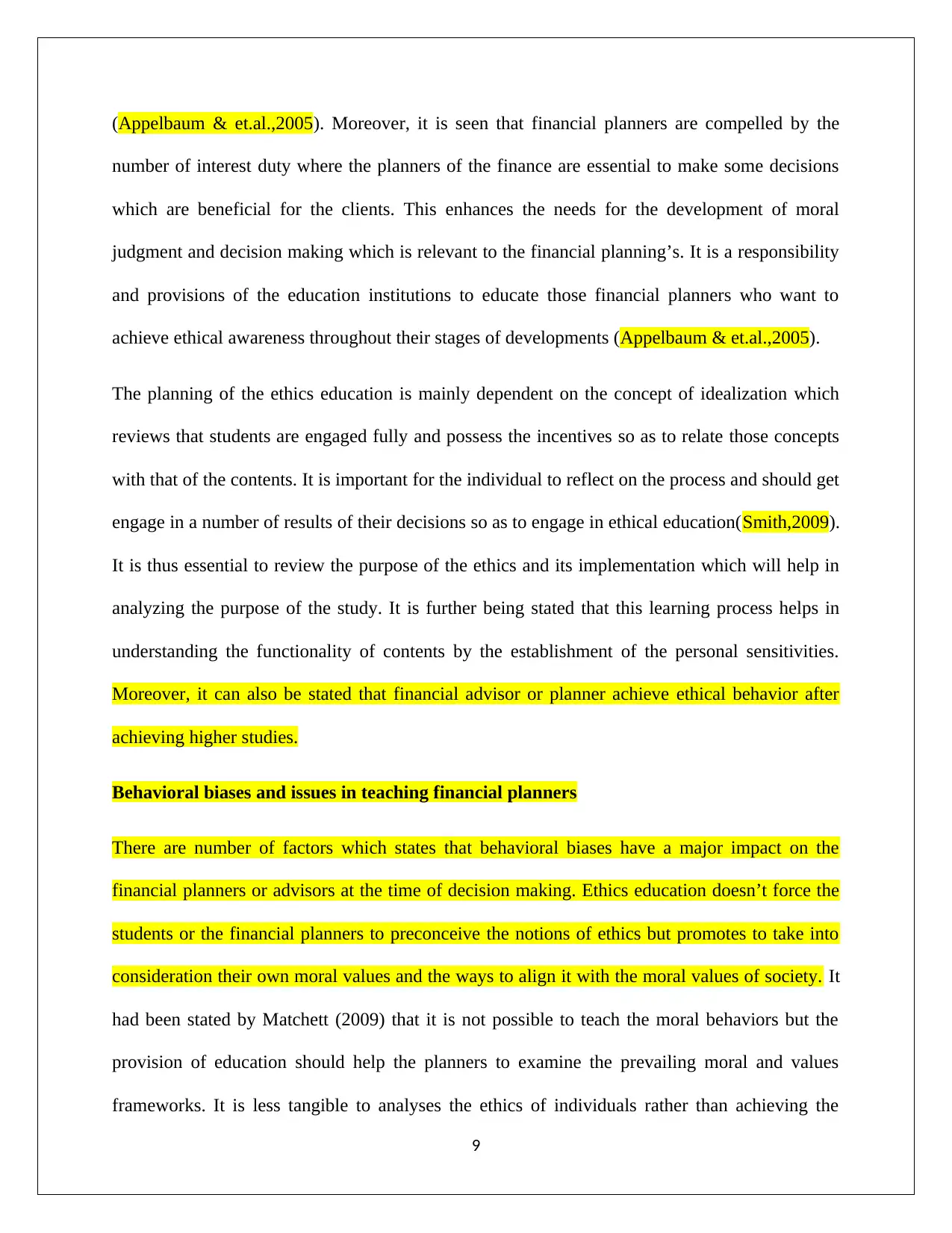
(Appelbaum & et.al.,2005). Moreover, it is seen that financial planners are compelled by the
number of interest duty where the planners of the finance are essential to make some decisions
which are beneficial for the clients. This enhances the needs for the development of moral
judgment and decision making which is relevant to the financial planning’s. It is a responsibility
and provisions of the education institutions to educate those financial planners who want to
achieve ethical awareness throughout their stages of developments (Appelbaum & et.al.,2005).
The planning of the ethics education is mainly dependent on the concept of idealization which
reviews that students are engaged fully and possess the incentives so as to relate those concepts
with that of the contents. It is important for the individual to reflect on the process and should get
engage in a number of results of their decisions so as to engage in ethical education(Smith,2009).
It is thus essential to review the purpose of the ethics and its implementation which will help in
analyzing the purpose of the study. It is further being stated that this learning process helps in
understanding the functionality of contents by the establishment of the personal sensitivities.
Moreover, it can also be stated that financial advisor or planner achieve ethical behavior after
achieving higher studies.
Behavioral biases and issues in teaching financial planners
There are number of factors which states that behavioral biases have a major impact on the
financial planners or advisors at the time of decision making. Ethics education doesn’t force the
students or the financial planners to preconceive the notions of ethics but promotes to take into
consideration their own moral values and the ways to align it with the moral values of society. It
had been stated by Matchett (2009) that it is not possible to teach the moral behaviors but the
provision of education should help the planners to examine the prevailing moral and values
frameworks. It is less tangible to analyses the ethics of individuals rather than achieving the
9
number of interest duty where the planners of the finance are essential to make some decisions
which are beneficial for the clients. This enhances the needs for the development of moral
judgment and decision making which is relevant to the financial planning’s. It is a responsibility
and provisions of the education institutions to educate those financial planners who want to
achieve ethical awareness throughout their stages of developments (Appelbaum & et.al.,2005).
The planning of the ethics education is mainly dependent on the concept of idealization which
reviews that students are engaged fully and possess the incentives so as to relate those concepts
with that of the contents. It is important for the individual to reflect on the process and should get
engage in a number of results of their decisions so as to engage in ethical education(Smith,2009).
It is thus essential to review the purpose of the ethics and its implementation which will help in
analyzing the purpose of the study. It is further being stated that this learning process helps in
understanding the functionality of contents by the establishment of the personal sensitivities.
Moreover, it can also be stated that financial advisor or planner achieve ethical behavior after
achieving higher studies.
Behavioral biases and issues in teaching financial planners
There are number of factors which states that behavioral biases have a major impact on the
financial planners or advisors at the time of decision making. Ethics education doesn’t force the
students or the financial planners to preconceive the notions of ethics but promotes to take into
consideration their own moral values and the ways to align it with the moral values of society. It
had been stated by Matchett (2009) that it is not possible to teach the moral behaviors but the
provision of education should help the planners to examine the prevailing moral and values
frameworks. It is less tangible to analyses the ethics of individuals rather than achieving the
9
⊘ This is a preview!⊘
Do you want full access?
Subscribe today to unlock all pages.

Trusted by 1+ million students worldwide
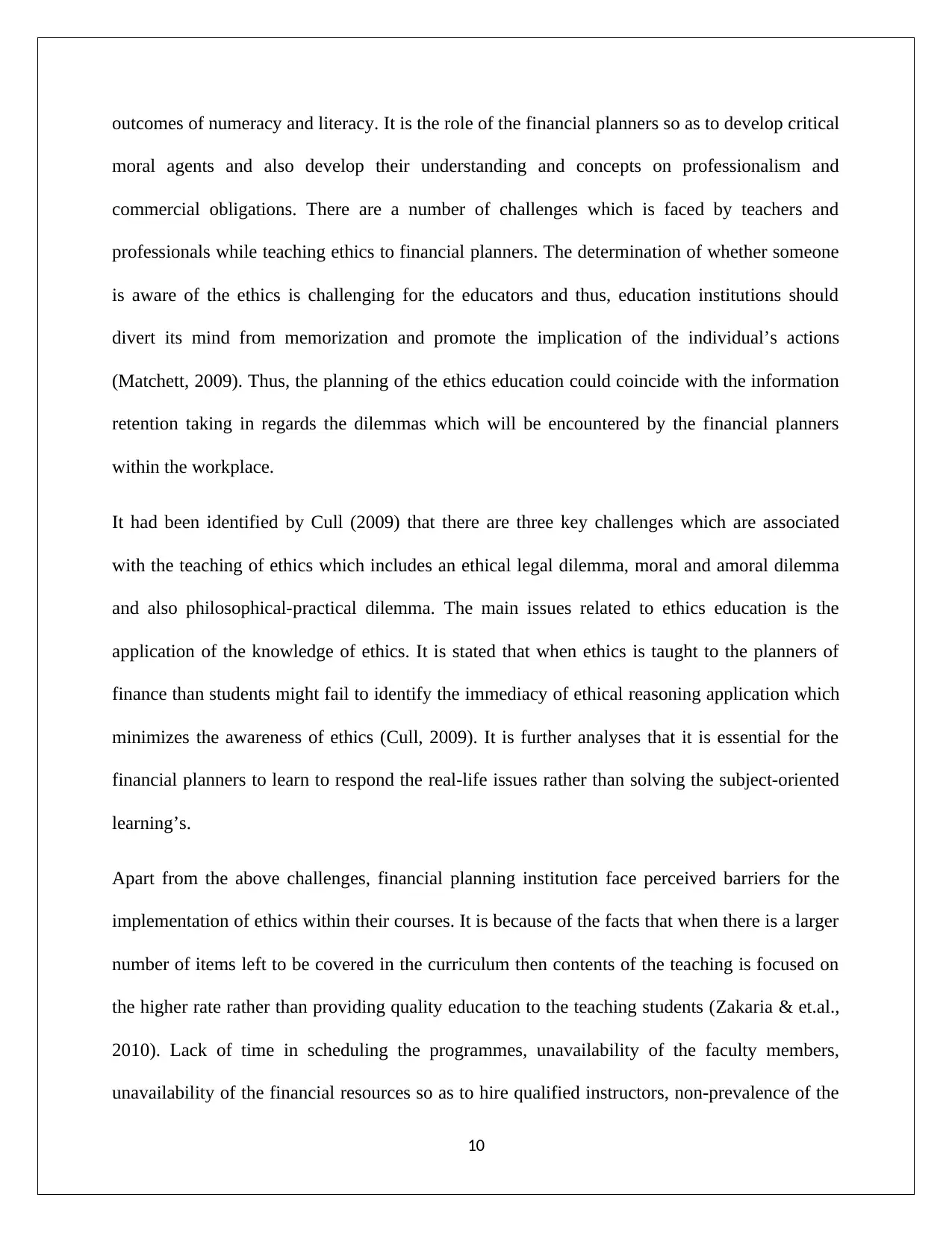
outcomes of numeracy and literacy. It is the role of the financial planners so as to develop critical
moral agents and also develop their understanding and concepts on professionalism and
commercial obligations. There are a number of challenges which is faced by teachers and
professionals while teaching ethics to financial planners. The determination of whether someone
is aware of the ethics is challenging for the educators and thus, education institutions should
divert its mind from memorization and promote the implication of the individual’s actions
(Matchett, 2009). Thus, the planning of the ethics education could coincide with the information
retention taking in regards the dilemmas which will be encountered by the financial planners
within the workplace.
It had been identified by Cull (2009) that there are three key challenges which are associated
with the teaching of ethics which includes an ethical legal dilemma, moral and amoral dilemma
and also philosophical-practical dilemma. The main issues related to ethics education is the
application of the knowledge of ethics. It is stated that when ethics is taught to the planners of
finance than students might fail to identify the immediacy of ethical reasoning application which
minimizes the awareness of ethics (Cull, 2009). It is further analyses that it is essential for the
financial planners to learn to respond the real-life issues rather than solving the subject-oriented
learning’s.
Apart from the above challenges, financial planning institution face perceived barriers for the
implementation of ethics within their courses. It is because of the facts that when there is a larger
number of items left to be covered in the curriculum then contents of the teaching is focused on
the higher rate rather than providing quality education to the teaching students (Zakaria & et.al.,
2010). Lack of time in scheduling the programmes, unavailability of the faculty members,
unavailability of the financial resources so as to hire qualified instructors, non-prevalence of the
10
moral agents and also develop their understanding and concepts on professionalism and
commercial obligations. There are a number of challenges which is faced by teachers and
professionals while teaching ethics to financial planners. The determination of whether someone
is aware of the ethics is challenging for the educators and thus, education institutions should
divert its mind from memorization and promote the implication of the individual’s actions
(Matchett, 2009). Thus, the planning of the ethics education could coincide with the information
retention taking in regards the dilemmas which will be encountered by the financial planners
within the workplace.
It had been identified by Cull (2009) that there are three key challenges which are associated
with the teaching of ethics which includes an ethical legal dilemma, moral and amoral dilemma
and also philosophical-practical dilemma. The main issues related to ethics education is the
application of the knowledge of ethics. It is stated that when ethics is taught to the planners of
finance than students might fail to identify the immediacy of ethical reasoning application which
minimizes the awareness of ethics (Cull, 2009). It is further analyses that it is essential for the
financial planners to learn to respond the real-life issues rather than solving the subject-oriented
learning’s.
Apart from the above challenges, financial planning institution face perceived barriers for the
implementation of ethics within their courses. It is because of the facts that when there is a larger
number of items left to be covered in the curriculum then contents of the teaching is focused on
the higher rate rather than providing quality education to the teaching students (Zakaria & et.al.,
2010). Lack of time in scheduling the programmes, unavailability of the faculty members,
unavailability of the financial resources so as to hire qualified instructors, non-prevalence of the
10
Paraphrase This Document
Need a fresh take? Get an instant paraphrase of this document with our AI Paraphraser
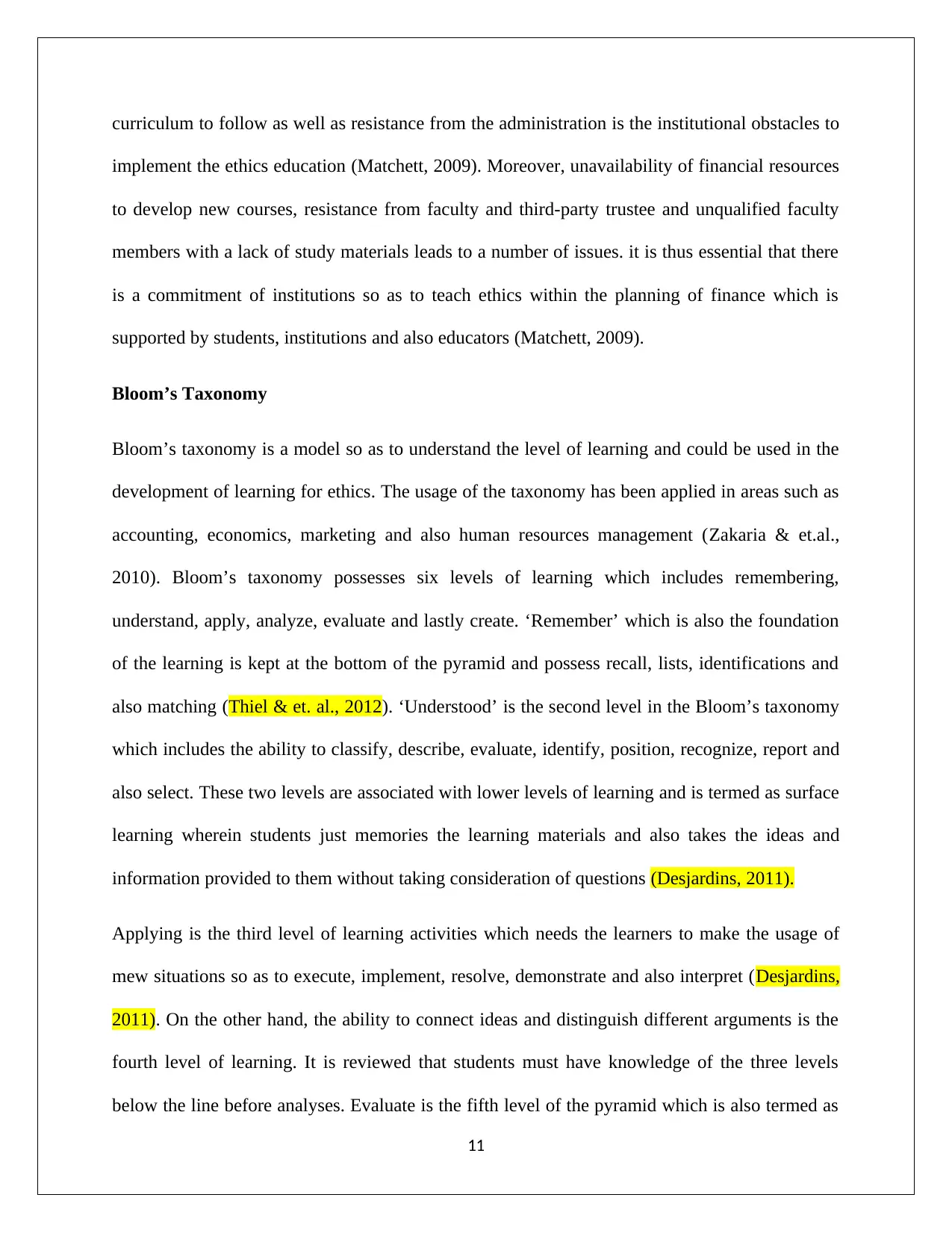
curriculum to follow as well as resistance from the administration is the institutional obstacles to
implement the ethics education (Matchett, 2009). Moreover, unavailability of financial resources
to develop new courses, resistance from faculty and third-party trustee and unqualified faculty
members with a lack of study materials leads to a number of issues. it is thus essential that there
is a commitment of institutions so as to teach ethics within the planning of finance which is
supported by students, institutions and also educators (Matchett, 2009).
Bloom’s Taxonomy
Bloom’s taxonomy is a model so as to understand the level of learning and could be used in the
development of learning for ethics. The usage of the taxonomy has been applied in areas such as
accounting, economics, marketing and also human resources management (Zakaria & et.al.,
2010). Bloom’s taxonomy possesses six levels of learning which includes remembering,
understand, apply, analyze, evaluate and lastly create. ‘Remember’ which is also the foundation
of the learning is kept at the bottom of the pyramid and possess recall, lists, identifications and
also matching (Thiel & et. al., 2012). ‘Understood’ is the second level in the Bloom’s taxonomy
which includes the ability to classify, describe, evaluate, identify, position, recognize, report and
also select. These two levels are associated with lower levels of learning and is termed as surface
learning wherein students just memories the learning materials and also takes the ideas and
information provided to them without taking consideration of questions (Desjardins, 2011).
Applying is the third level of learning activities which needs the learners to make the usage of
mew situations so as to execute, implement, resolve, demonstrate and also interpret (Desjardins,
2011). On the other hand, the ability to connect ideas and distinguish different arguments is the
fourth level of learning. It is reviewed that students must have knowledge of the three levels
below the line before analyses. Evaluate is the fifth level of the pyramid which is also termed as
11
implement the ethics education (Matchett, 2009). Moreover, unavailability of financial resources
to develop new courses, resistance from faculty and third-party trustee and unqualified faculty
members with a lack of study materials leads to a number of issues. it is thus essential that there
is a commitment of institutions so as to teach ethics within the planning of finance which is
supported by students, institutions and also educators (Matchett, 2009).
Bloom’s Taxonomy
Bloom’s taxonomy is a model so as to understand the level of learning and could be used in the
development of learning for ethics. The usage of the taxonomy has been applied in areas such as
accounting, economics, marketing and also human resources management (Zakaria & et.al.,
2010). Bloom’s taxonomy possesses six levels of learning which includes remembering,
understand, apply, analyze, evaluate and lastly create. ‘Remember’ which is also the foundation
of the learning is kept at the bottom of the pyramid and possess recall, lists, identifications and
also matching (Thiel & et. al., 2012). ‘Understood’ is the second level in the Bloom’s taxonomy
which includes the ability to classify, describe, evaluate, identify, position, recognize, report and
also select. These two levels are associated with lower levels of learning and is termed as surface
learning wherein students just memories the learning materials and also takes the ideas and
information provided to them without taking consideration of questions (Desjardins, 2011).
Applying is the third level of learning activities which needs the learners to make the usage of
mew situations so as to execute, implement, resolve, demonstrate and also interpret (Desjardins,
2011). On the other hand, the ability to connect ideas and distinguish different arguments is the
fourth level of learning. It is reviewed that students must have knowledge of the three levels
below the line before analyses. Evaluate is the fifth level of the pyramid which is also termed as
11
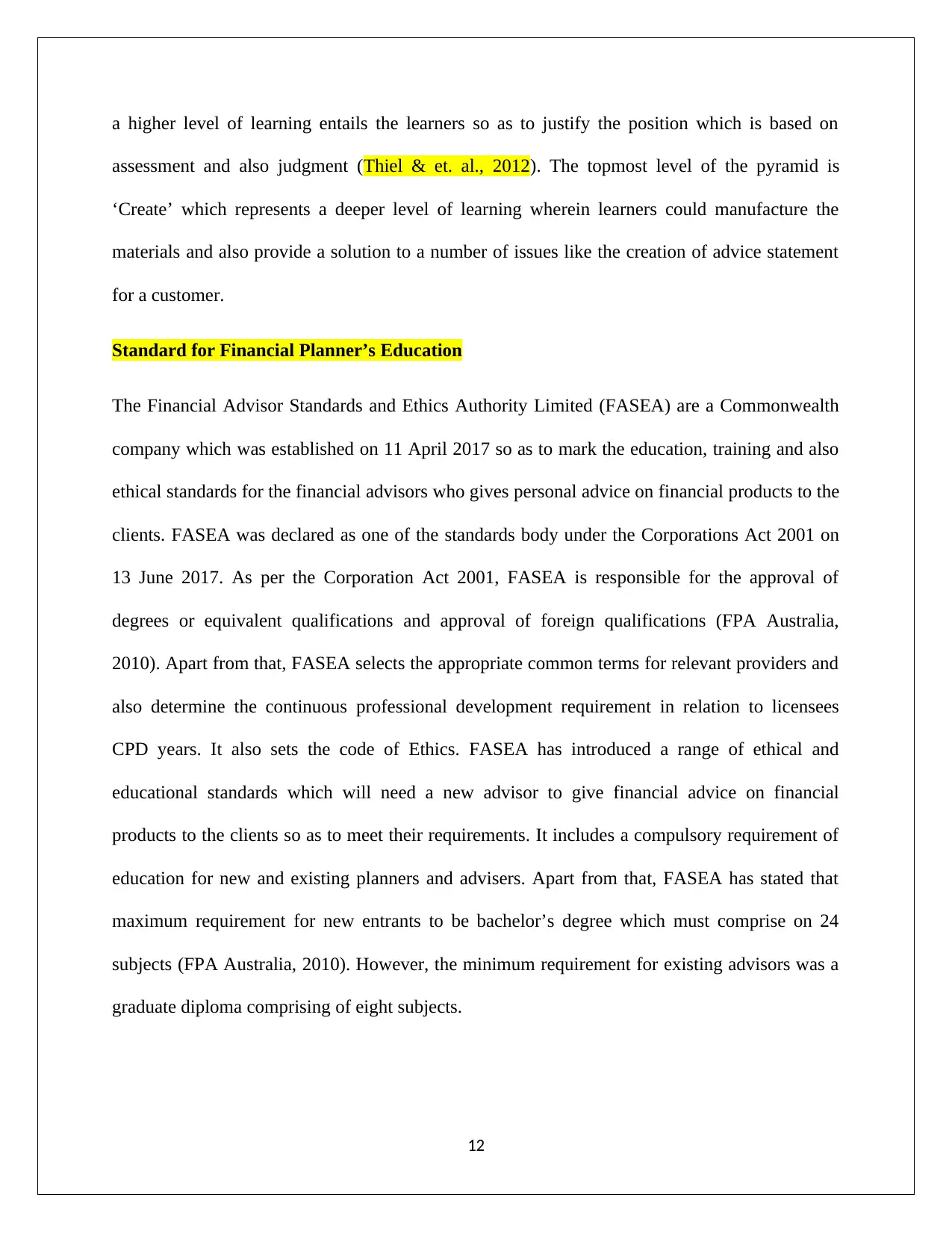
a higher level of learning entails the learners so as to justify the position which is based on
assessment and also judgment (Thiel & et. al., 2012). The topmost level of the pyramid is
‘Create’ which represents a deeper level of learning wherein learners could manufacture the
materials and also provide a solution to a number of issues like the creation of advice statement
for a customer.
Standard for Financial Planner’s Education
The Financial Advisor Standards and Ethics Authority Limited (FASEA) are a Commonwealth
company which was established on 11 April 2017 so as to mark the education, training and also
ethical standards for the financial advisors who gives personal advice on financial products to the
clients. FASEA was declared as one of the standards body under the Corporations Act 2001 on
13 June 2017. As per the Corporation Act 2001, FASEA is responsible for the approval of
degrees or equivalent qualifications and approval of foreign qualifications (FPA Australia,
2010). Apart from that, FASEA selects the appropriate common terms for relevant providers and
also determine the continuous professional development requirement in relation to licensees
CPD years. It also sets the code of Ethics. FASEA has introduced a range of ethical and
educational standards which will need a new advisor to give financial advice on financial
products to the clients so as to meet their requirements. It includes a compulsory requirement of
education for new and existing planners and advisers. Apart from that, FASEA has stated that
maximum requirement for new entrants to be bachelor’s degree which must comprise on 24
subjects (FPA Australia, 2010). However, the minimum requirement for existing advisors was a
graduate diploma comprising of eight subjects.
12
assessment and also judgment (Thiel & et. al., 2012). The topmost level of the pyramid is
‘Create’ which represents a deeper level of learning wherein learners could manufacture the
materials and also provide a solution to a number of issues like the creation of advice statement
for a customer.
Standard for Financial Planner’s Education
The Financial Advisor Standards and Ethics Authority Limited (FASEA) are a Commonwealth
company which was established on 11 April 2017 so as to mark the education, training and also
ethical standards for the financial advisors who gives personal advice on financial products to the
clients. FASEA was declared as one of the standards body under the Corporations Act 2001 on
13 June 2017. As per the Corporation Act 2001, FASEA is responsible for the approval of
degrees or equivalent qualifications and approval of foreign qualifications (FPA Australia,
2010). Apart from that, FASEA selects the appropriate common terms for relevant providers and
also determine the continuous professional development requirement in relation to licensees
CPD years. It also sets the code of Ethics. FASEA has introduced a range of ethical and
educational standards which will need a new advisor to give financial advice on financial
products to the clients so as to meet their requirements. It includes a compulsory requirement of
education for new and existing planners and advisers. Apart from that, FASEA has stated that
maximum requirement for new entrants to be bachelor’s degree which must comprise on 24
subjects (FPA Australia, 2010). However, the minimum requirement for existing advisors was a
graduate diploma comprising of eight subjects.
12
⊘ This is a preview!⊘
Do you want full access?
Subscribe today to unlock all pages.

Trusted by 1+ million students worldwide
1 out of 15
Related Documents
Your All-in-One AI-Powered Toolkit for Academic Success.
+13062052269
info@desklib.com
Available 24*7 on WhatsApp / Email
![[object Object]](/_next/static/media/star-bottom.7253800d.svg)
Unlock your academic potential
Copyright © 2020–2026 A2Z Services. All Rights Reserved. Developed and managed by ZUCOL.





